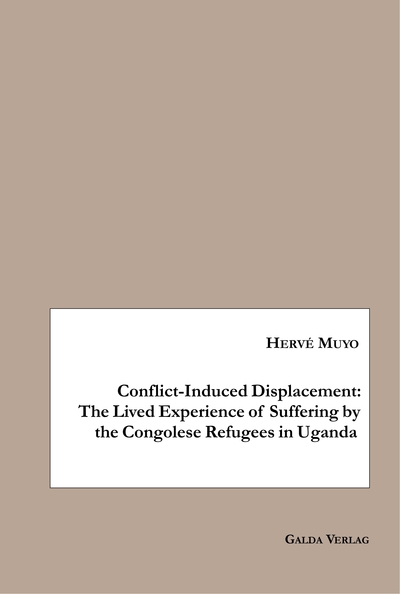Nous utilisons des cookies pour améliorer votre expérience. Pour nous conformer à la nouvelle directive sur la vie privée, nous devons demander votre consentement à l’utilisation de ces cookies. En savoir plus.
Conflict-Induced Displacement: The Lived Experience of Suffering bythe Congolese Refugees in Uganda
EAN : 9783962030551
Édition papier
EAN : 9783962030551
Paru le : 28 févr. 2019
48,30 €
45,78 €
Disponible
Pour connaître votre prix et commander, identifiez-vous
Notre engagement qualité
-
 Livraison gratuite
Livraison gratuite
en France sans minimum
de commande -
 Manquants maintenus
Manquants maintenus
en commande
automatiquement -
 Un interlocuteur
Un interlocuteur
unique pour toutes
vos commandes -
 Toutes les licences
Toutes les licences
numériques du marché
au tarif éditeur -
 Assistance téléphonique
Assistance téléphonique
personalisée sur le
numérique -
 Service client
Service client
Du Lundi au vendredi
de 9h à 18h
- EAN13 : 9783962030551
- Réf. éditeur : 250750
- Date Parution : 28 févr. 2019
- Disponibilite : Disponible
- Barème de remise : NS
- Nombre de pages : 158
- Format : H:230 mm L:155 mm E:8 mm
- Poids : 245gr
- Résumé : A phenomenological study was undertaken to consider the essence of the lived experience of displacement as perceived by a group of ten Congolese refugees exiled in Uganda. Semi-structured individual interviews found displacement to be an experience of suffering from loss; primarily loss of home. Clearly, the "home" articulated in refugee narratives was an imagined home; imagined as the ideal place where security, love, connectedness, respect define life. In addition, Congolese refugees viewed displacement as an experience of suffering from separation, restless wandering and estrangement. Participants also reported that displacement had a negative impact on their lives. This study tied human needs theory with constructivism and framed the latter as both a driver (of conflict and flight), but also as the basis of reconstruction (needs satisfaction) that is made possible because the imagined "home" is a construct that can be reconstructed.The findings of this study point to how some refugee services might be structured (i.e. giving people a sense of home is not necessarily keeping them in a state of suspended limbo with perpetual expectations of returning to their former home, but home can be reconstructed even in the refugee locations).
- Biographie : Hervé Muyo, Ph. D. is an associate professor at Université Pédagogique Nationale (UPN) and Université Catholique du Congo (UCC) in the Democratic Republic of the Congo. He is also a visting professor at Université Catholique de Bukavu (UCB). He is the current vice director of Centre d'Etudes et de Promotion des Recherches en Intervention Socio-Economiques et Socio-Politiques Père Hardy Développement à l'Université Pédagogique Nationale (UPN/CEPRISE/PHD), Kinshasa, DR Congo. Besides, he is a consultant with many humanitarian international organizations that work in the DR Congo and around the world such as Christian Aid and Deutsche Zusammernarbeit (BGF).His research interest is on conflict and migration, gender violence, conflict prevention, peace building, mediation, negotiation et leadership, emotional intelligence, women leadership and empowerment.

